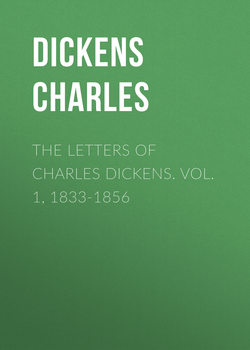Читать книгу The Letters of Charles Dickens. Vol. 1, 1833-1856 - Чарльз Диккенс, Geoffrey Palmer, Miriam Margolyes - Страница 6
Book I
1837
ОглавлениеNARRATIVE
From the commencement of "The Pickwick Papers," and of Charles Dickens's married life, dates the commencement of his literary life and his sudden world-wide fame. And this year saw the beginning of many of those friendships which he most valued, and of which he had most reason to be proud, and which friendships were ended only by death.
The first letters which we have been able to procure to Mr. Macready and Mr. Harley will be found under this date. In January, 1837, he was living in Furnival's Inn, where his first child, a son, was born. It was an eventful year to him in many ways. He removed from Furnival's Inn to Doughty Street in March, and here he sustained the first great grief of his life. His young sister-in-law, Mary Hogarth, to whom he was devotedly attached, died very suddenly, at his house, on the 7th May. In the autumn of this year he took lodgings at Broadstairs. This was his first visit to that pleasant little watering-place, of which he became very fond, and whither he removed for the autumn months with all his household, for many years in succession.
Besides the monthly numbers of "Pickwick," which were going on through this year until November, when the last number appeared, he had commenced "Oliver Twist," which was appearing also monthly, in the magazine called "Bentley's Miscellany," long before "Pickwick" was completed. And during this year he had edited, for Mr. Bentley, "The Life of Grimaldi," the celebrated clown. To this book he wrote himself only the preface, and altered and rearranged the autobiographical MS. which was in Mr. Bentley's possession.
The letter to Mr. Harley, which bears no date, but must have been written either in 1836 or 1837, refers to a farce called "The Strange Gentleman" (founded on one of the "Sketches," called the "Great Winglebury Duel"), which he wrote expressly for Mr. Harley, and which was produced at the St. James's Theatre, under the management of Mr. Braham. The only other piece which he wrote for that theatre was the story of an operetta, called "The Village Coquettes," the music of which was composed by Mr. John Hullah.
Mr. J. P. Harley
48, Doughty Street, Saturday Morning.
My Dear Sir,
I have considered the terms on which I could afford just now to sell Mr. Braham the acting copyright in London of an entirely new piece for the St. James's Theatre; and I could not sit down to write one in a single act of about one hour long, under a hundred pounds. For a new piece in two acts, a hundred and fifty pounds would be the sum I should require.
I do not know whether, with reference to arrangements that were made with any other writers, this may or may not appear a large item. I state it merely with regard to the value of my own time and writings at this moment; and in so doing I assure you I place the remuneration below the mark rather than above it.
As you begged me to give you my reply upon this point, perhaps you will lay it before Mr. Braham. If these terms exceed his inclination or the ability of the theatre, there is an end of the matter, and no harm done.
Believe me ever faithfully yours.
Mr. W. C. Macready
48, Doughty Street, Wednesday Evening.
My Dear Sir,
There is a semi-business, semi-pleasure little dinner which I intend to give at The Prince of Wales, in Leicester Place, Leicester Square, on Saturday, at five for half-past precisely, at which only Talfourd, Forster, Ainsworth, Jerdan, and the publishers will be present. It is to celebrate (that is too great a word, but I can think of no better) the conclusion of my "Pickwick" labours; and so I intend, before you take that roll upon the grass you spoke of, to beg your acceptance of one of the first complete copies of the work. I shall be much delighted if you would join us.
I know too well the many anxieties that press upon you just now to seek to persuade you to come if you would prefer a night's repose and quiet. Let me assure you, notwithstanding, most honestly and heartily that there is no one I should be more happy or gratified to see, and that among your brilliant circle of well-wishers and admirers you number none more unaffectedly and faithfully yours than,
My dear Sir, yours most truly.
